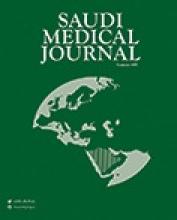Research ArticleOriginal Article
Open Access
Sociodemographic and clinical predictors of refractory type 2 diabetes patients
Findings from a case-control study
Turki J. Alharbi, Ayla M. Tourkmani, Abdulaziz Bin Rsheed, Abood F. Al Abood and Yasser K. Alotaibi
Saudi Medical Journal February 2021, 42 (2) 181-188; DOI: https://doi.org/10.15537/smj.2021.2.25694
Turki J. Alharbi
From the Family and Community Medicine Department (Alharbi, Tourkmani, Bin Rsheed, Al Abood), Chronic Illness Center, Prince Sultan Military Medical City; and from the Department of Quality and Patient Safety (Alotaibi), Armed Forces Medical Services Directorate, Riyadh, Kingdom of Saudi Arabia.
MDAyla M. Tourkmani
From the Family and Community Medicine Department (Alharbi, Tourkmani, Bin Rsheed, Al Abood), Chronic Illness Center, Prince Sultan Military Medical City; and from the Department of Quality and Patient Safety (Alotaibi), Armed Forces Medical Services Directorate, Riyadh, Kingdom of Saudi Arabia.
PhDAbdulaziz Bin Rsheed
From the Family and Community Medicine Department (Alharbi, Tourkmani, Bin Rsheed, Al Abood), Chronic Illness Center, Prince Sultan Military Medical City; and from the Department of Quality and Patient Safety (Alotaibi), Armed Forces Medical Services Directorate, Riyadh, Kingdom of Saudi Arabia.
MDAbood F. Al Abood
From the Family and Community Medicine Department (Alharbi, Tourkmani, Bin Rsheed, Al Abood), Chronic Illness Center, Prince Sultan Military Medical City; and from the Department of Quality and Patient Safety (Alotaibi), Armed Forces Medical Services Directorate, Riyadh, Kingdom of Saudi Arabia.
MDYasser K. Alotaibi
From the Family and Community Medicine Department (Alharbi, Tourkmani, Bin Rsheed, Al Abood), Chronic Illness Center, Prince Sultan Military Medical City; and from the Department of Quality and Patient Safety (Alotaibi), Armed Forces Medical Services Directorate, Riyadh, Kingdom of Saudi Arabia.
MD
References
- 1.↵
- Aronson R.
- 2.↵
- 3.↵
- Leiter LA,
- Berard L,
- Bowering CK,
- Cheng AY,
- Dawson KG,
- Ekoé JM, et al.
- 4.
- Borgermans L,
- Goderis G,
- Van Den Broeke C,
- Verbeke G,
- Carbonez A,
- Ivanova A, et al.
- 5.↵
- Clement M,
- Harvey B,
- Rabi DM,
- Roscoe RS,
- Sherifali D.
- 6.↵
- Riddle MC,
- Ambrosius WT,
- Brillon DJ,
- Buse JB,
- Byington RP,
- Cohen RM, et al.
- 7.↵
- Alqurashi KA,
- Aljabri KS,
- Bokhari SA.
- 8.↵
- Al-Rubeaan KA,
- Youssef AM,
- Subhani SN,
- Ahmad NA,
- Al-Sharqawi AH,
- Ibrahim HM.
- 9.↵
- Shah BR,
- Hux JE,
- Laupacis A,
- Mdcm BZ,
- Austin PC,
- Van Walraven C.
- 10.↵
- Shorr RI,
- Franse LV,
- Resnick HE,
- Di Bari M,
- Johnson KC,
- Pahor M.
- 11.↵
- Toh MPHS,
- Wu CX,
- Leong HSS.
- 12.↵
- Bruce D,
- Davis W,
- Davis T.
- 13.↵
- Rothenbacher D,
- Ruter G,
- Saam S,
- Brenner H.
- 14.↵
- Glasgow RE,
- Hampson SE,
- Strycker LA,
- Ruggiero L.
- 15.↵
- El-Kebbi IM,
- Cook CB,
- Ziemer DC,
- Miller CD,
- Gallina DL,
- Phillips LS.
- 16.↵
- Song S,
- Hardisty C.
- 17.↵
- 18.
- 19.↵
- Verma M,
- Paneri S,
- Badi P,
- Raman P.
- 20.↵
- 21.↵
- Group UPDS.
- 22.↵
- 23.
- Mohammadi H,
- Abdelouahed E,
- Hassar M,
- Bouchrif B,
- Qarbal B,
- Dahbi F, et al.
- 24.↵
- 25.↵
In this issue
Sociodemographic and clinical predictors of refractory type 2 diabetes patients
Turki J. Alharbi, Ayla M. Tourkmani, Abdulaziz Bin Rsheed, Abood F. Al Abood, Yasser K. Alotaibi
Saudi Medical Journal Feb 2021, 42 (2) 181-188; DOI: 10.15537/smj.2021.2.25694
Jump to section
Related Articles
- No related articles found.
Cited By...
- No citing articles found.





